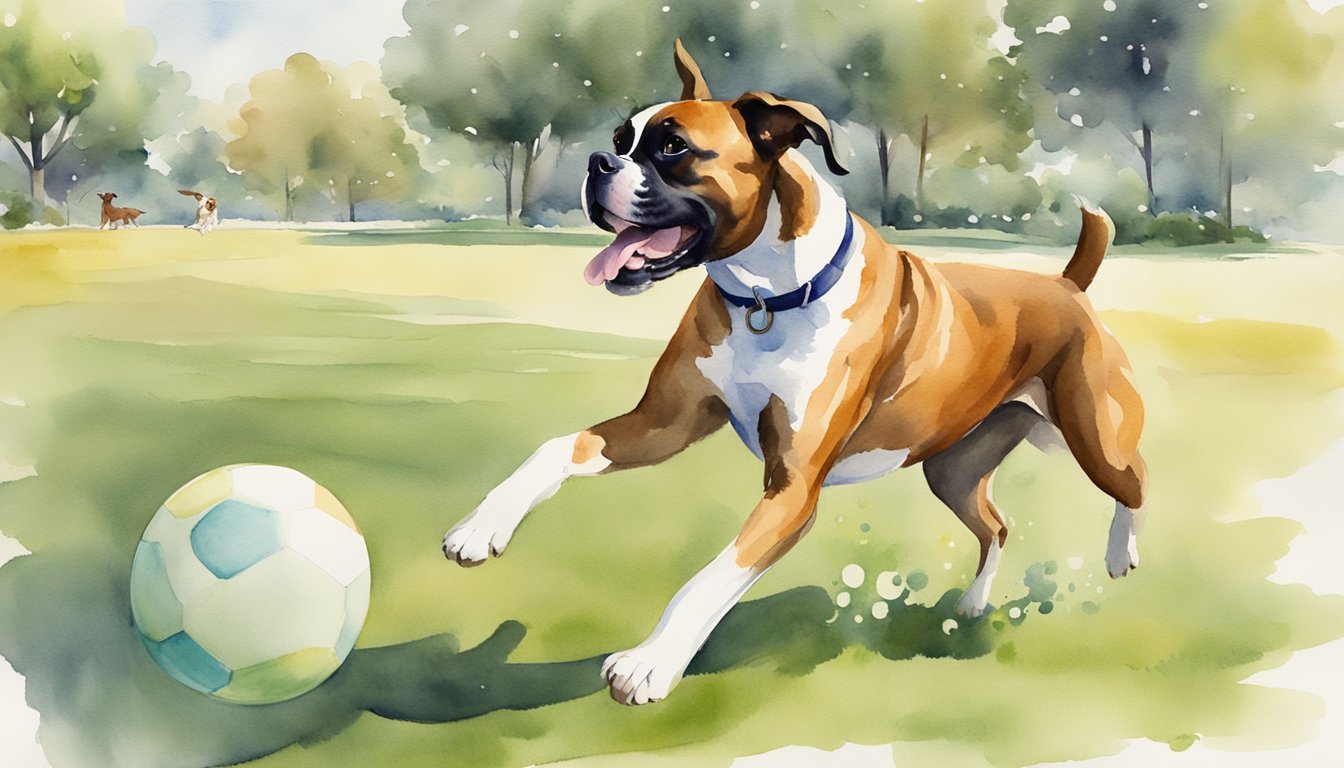10 Ways to Keep Your Boxer Happy and Healthy: Essential Tips for Dog Owners

Boxer dogs are known for their energy, loyalty, and playful nature.
As a Boxer owner, you want to make sure your furry friend stays happy and healthy throughout their life.
This article will give you practical tips to keep your Boxer in top shape.

Taking care of your Boxer’s physical and mental well-being is key to a long and joyful life together. By following the advice in this guide, you’ll learn how to provide the best care for your Boxer.
From exercise routines to diet choices, these tips will help you create a loving home for your canine companion.
1) Regular Exercise Sessions

Boxers need plenty of exercise to stay happy and healthy.
These energetic dogs thrive on daily physical activity.
Aim for at least 30-45 minutes of exercise each day.
You can split this into two shorter sessions if that works better for your schedule.
Morning and evening walks are a great routine for your Boxer.
Walking your Boxer regularly helps keep them fit and provides mental stimulation.
Mix up your routes to keep things interesting.
Playing fetch or running around in a fenced yard are fun ways to exercise your Boxer.
These activities let them burn off energy and use their natural athleticism.
Swimming is another great exercise option for Boxers.
Many enjoy the water and it’s easy on their joints.
Just be sure to supervise them closely.
Remember to adjust exercise based on your Boxer’s age and health.
Puppies and senior dogs may need shorter, gentler sessions.
Always bring water on longer outings.
Boxers can overheat easily, so watch for signs of tiredness or distress.
Regular exercise helps prevent obesity, improves heart health, and keeps your Boxer’s muscles strong.
It also reduces boredom and unwanted behaviors.
2) Balanced Diet with Quality Protein
A balanced diet is key to keeping your boxer happy and healthy.
Boxers need the right mix of nutrients to maintain their energy and strength.
Protein is especially important for boxers.
It helps build and repair muscles after tough workouts. Lean chicken, fish, and eggs are great protein sources for your boxer.
Don’t forget about carbs.
They give your boxer the energy to train hard.
Whole grains, fruits, and vegetables are good choices.
Healthy fats are also needed.
They help your boxer’s body work well.
You can add some nuts or olive oil to their meals.
Make sure your boxer drinks enough water.
It keeps them hydrated during exercise.
You can give your boxer snacks like almond butter sandwiches or trail mix.
These provide quick energy boosts.
Pay attention to how much your boxer eats.
The amount depends on their size, age, and how much they exercise.
Talk to your vet about your boxer’s diet.
They can help you make a meal plan that fits your dog’s needs.
Remember, each boxer is different.
What works for one might not work for another.
Watch how your boxer responds to their diet and adjust as needed.
3) Mental Stimulation Games
Mental stimulation is key to keeping your Boxer happy and healthy.
These smart dogs need regular brain exercise to stay sharp and content.
Try puzzle toys that challenge your Boxer to figure out how to get treats.
Start with simple ones and gradually increase the difficulty as your dog learns.
Hide-and-seek games are great for Boxers.
Hide treats or toys around the house and encourage your dog to find them.
This taps into their natural hunting instincts.
Teach your Boxer new tricks regularly.
This breed loves to learn and please their owners.
Short, fun training sessions provide mental stimulation and strengthen your bond.
Set up an obstacle course in your yard.
Guide your Boxer through tunnels, over jumps, and around cones.
This combines physical activity with mental challenges.
Play the “cup game” with your Boxer.
Hide a treat under one of three cups, then shuffle them.
Let your dog guess which cup hides the treat.
Introduce your Boxer to scent work.
Hide a strongly scented item and encourage your dog to find it.
This engages their powerful sense of smell in a fun way.
Rotate your Boxer’s toys regularly.
This keeps things fresh and interesting, preventing boredom.
Introduce new toys periodically to spark curiosity.
Use brain-training games designed for dogs.
Many pet stores offer these specially crafted puzzles and games.
Remember to keep sessions short and fun.
Praise your Boxer’s efforts to keep them engaged and excited about these mental workouts.
4) Frequent Vet Check-Ups

Regular vet visits are key to keeping your Boxer healthy. Yearly check-ups can help catch health issues early, before they become serious problems.
Boxers are prone to certain health conditions like heart problems and hip dysplasia.
Routine exams allow your vet to monitor these potential issues.
During check-ups, your vet will perform physical exams and may recommend tests.
These can include blood work, heartworm tests, and x-rays if needed.
Vet visits are also a chance to stay up-to-date on vaccinations and preventive care.
Your vet can advise on flea, tick, and heartworm prevention methods.
Some Boxers may feel anxious at the vet’s office. You can help by making visits positive experiences.
Bring treats and stay calm to help your dog feel at ease.
Regular weigh-ins at the vet can help you keep track of your Boxer’s weight.
This is important for preventing obesity, which can lead to other health issues.
Remember, your vet is a valuable resource.
They can offer advice on diet, exercise, and any behavioral concerns you might have about your Boxer.
5) Proper Grooming and Hygiene
Boxers have short coats that are easy to care for, but regular grooming is still important. Brush your Boxer regularly to remove loose hair and keep their coat shiny.
This also helps distribute natural oils and promotes healthy skin.
Bath your Boxer every few months or when they get dirty.
Use a gentle dog shampoo to avoid irritating their skin.
Don’t forget to clean between their toes, as dirt can accumulate there.
Trim your Boxer’s nails when you hear them clicking on the floor.
If you’re not comfortable doing this, ask a groomer or vet to show you how.
Check your Boxer’s ears weekly for signs of infection or wax buildup.
Clean them gently with a damp cloth or ear cleaner recommended by your vet.
Brush your Boxer’s teeth at least once a week to prevent dental problems.
Use a dog-specific toothpaste and brush.
During grooming sessions, check your Boxer’s skin for any lumps, bumps, or irritations.
This helps catch health issues early.
Consider professional grooming every few months.
A professional can give your Boxer a thorough cleaning and check for any issues you might have missed.
Remember, grooming time is also bonding time.
Make it a positive experience for your Boxer with treats and praise.
6) Comfortable Bed with Adequate Space

Boxers need a cozy place to rest and recharge.
A good bed is key to keeping your Boxer happy and healthy.
Choose a bed that’s big enough for your Boxer to stretch out fully.
Measure your dog and add a few inches to make sure the bed is roomy enough.
Look for orthopedic dog beds designed for large breeds.
These beds offer extra support for your Boxer’s joints and muscles.
Consider the material of the bed.
Durable polyester is a good choice as it can withstand your Boxer’s energy and playfulness.
Elevated dog beds can help keep your Boxer cool.
These beds allow air to flow underneath, which is great for warm weather.
Make sure the bed has a removable cover.
This makes cleaning easier and helps keep your Boxer’s sleeping area fresh.
If your Boxer likes to curl up, a round or donut-shaped bed might be a good fit.
These beds provide a sense of security for some dogs.
Place the bed in a quiet area of your home where your Boxer can relax without disturbance.
This will help ensure your dog gets quality rest.
Remember to replace the bed when it shows signs of wear.
A comfortable bed contributes to your Boxer’s overall well-being and happiness.
7) Socialization with Other Dogs
Boxers can get along well with other dogs when properly socialized.
Start early to help your Boxer develop good social skills.
Take your Boxer to puppy classes or organized playdates.
This allows them to interact with different dogs in a controlled setting.
Introduce your Boxer to new dogs gradually.
Keep initial meetings short and positive.
Watch for signs of stress or aggression.
Teach your Boxer focus games to help them stay calm around other dogs.
Reward good behavior with treats and praise.
Go on walks in dog-friendly areas.
This exposes your Boxer to other dogs without forced interaction.
Supervise all playtime between your Boxer and other dogs.
Step in if play gets too rough.
Give your Boxer plenty of exercise before social situations.
A tired dog is often calmer and better behaved.
Be patient and consistent with socialization.
Some Boxers may take more time to feel comfortable around other dogs.
Remember that not all Boxers will enjoy the company of every dog.
Respect your pet’s preferences and comfort level.
With proper socialization and training, your Boxer can become a friendly, well-adjusted companion who enjoys the company of other dogs.
8) Interactive Toys for Engagement
Boxers are smart and energetic dogs that need mental stimulation.
Interactive toys can keep them busy and happy.
Puzzle toys are great for Boxers.
These toys have hidden treats that your dog must figure out how to get.
They help keep your Boxer’s mind sharp.
Treat-dispensing balls are another fun option.
Your Boxer will love chasing the ball around to get the treats inside.
This gives them both mental and physical exercise.
Rope toys are perfect for playing tug-of-war with your Boxer.
Choose a durable rope toy made of 100% cotton.
You can also use it for fetch.
Kong toys are tough and can be filled with treats.
Your Boxer will spend time trying to get the treats out.
This keeps them busy when you’re not home.
Squeaky toys are often a hit with Boxers.
The noise keeps them interested and engaged.
Look for sturdy ones that can stand up to chewing.
Rotating your Boxer’s toys keeps things fresh.
Put some away for a while, then bring them back out later.
Your dog will be excited to see them again.
Remember to always supervise your Boxer when they play with new toys.
This ensures they’re using them safely and not destroying them.
9) Basic Obedience Training

Training your Boxer is key to a happy relationship.
Boxers are smart and eager to please, which makes them great students.
Start with simple commands like “sit,” “stay,” and “come.” Use treats and praise to reward good behavior.
This positive reinforcement works well for Boxers.
Keep training sessions short, about 10-15 minutes.
Boxers can get bored easily.
Mix up the commands to keep things interesting.
Be patient and consistent.
Repeat commands daily.
Your Boxer will learn faster if you stick to a routine.
Train in different places to help your dog generalize commands.
Start in a quiet room, then move to the yard or park.
Teach your Boxer to walk nicely on a leash.
This skill is important for daily walks and vet visits.
As your dog improves, add more complex commands. “Leave it” and “drop it” can keep your Boxer safe from harmful objects.
Remember, training is a chance to bond with your dog.
Keep it fun and positive.
Your Boxer will enjoy learning and spending time with you.
10) Hydration with Clean Water

Keeping your Boxer well-hydrated is key to their health and happiness.
Make sure your dog always has access to fresh, clean water.
Change your Boxer’s water daily and clean their bowl regularly.
This prevents bacteria growth and keeps the water tasting good.
Consider using a water bottle you enjoy for your Boxer.
A fun, portable bottle makes it easy to offer water during walks or trips.
Pay extra attention to hydration in hot weather or after exercise.
Your Boxer may need more water at these times.
If your dog isn’t drinking enough, try adding some low-sodium chicken broth to their water.
This can make it more appealing.
You can also give your Boxer water-rich fruits and vegetables as treats.
Watermelon, cucumber, and celery are good options.
Watch for signs of dehydration in your Boxer.
These include dry gums, loss of skin elasticity, and lethargy.
Remember, proper hydration helps your Boxer’s heart pump blood more easily and keeps their muscles working well.
It’s an important part of keeping them healthy.
Understanding Your Boxer’s Needs
Boxers have specific needs to stay happy and healthy.
Meeting their nutritional and exercise requirements is key to their wellbeing.
Nutritional Requirements
Boxers need a diet high in protein and low in fat.
Feed your Boxer quality dog food that meets their nutritional needs.
Look for brands like Fromm, Earthborn, Royal Canin, or Nutrisource.
Adult Boxers typically need 2-3 meals per day.
Puppies may need more frequent feeding.
Watch portion sizes to maintain a healthy weight.
Overfeeding can lead to obesity and health issues.
Make sure your Boxer has access to fresh water.
They should drink about 1.5 cups of water for every 10 pounds of body weight daily.
Exercise Essentials
Boxers are energetic dogs that need regular exercise. Take your Boxer for walks twice a day.
Each walk should last 20-30 minutes for puppies.
Adult Boxers may need longer walks or more intense exercise.
Consider activities like:
- Fetch
- Agility training
- Swimming
- Jogging (for adult dogs)
Mental stimulation is also important.
Provide puzzle toys or training sessions to keep your Boxer’s mind active.
Regular exercise helps prevent obesity, improves behavior, and strengthens your bond with your Boxer.
Preventive Healthcare
Taking care of your Boxer’s health before problems arise is key.
Regular check-ups and staying on top of vaccines and parasite control can help your dog live a long, happy life.
Regular Veterinary Check-Ups
Your Boxer needs yearly vet visits to stay healthy.
These check-ups help catch issues early.
The vet will do a full exam, checking your dog’s weight, teeth, and overall health.
They may run blood tests to look for hidden problems.
Boxers can get heart issues, so your vet might listen closely to your dog’s heart.
They’ll also check for lumps, which is important since Boxers can get cancer.
Ask your vet about the right diet for your Boxer.
Keeping your dog at a healthy weight helps prevent joint problems.
Males should weigh 65-80 pounds, while females are usually 15 pounds lighter.
Vaccinations and Parasite Control
Keeping your Boxer up to date on shots protects them from serious illnesses.
Core vaccines include:
- Rabies
- Distemper
- Parvovirus
- Adenovirus
Your vet may suggest other vaccines based on your dog’s lifestyle and where you live.
Parasite control is also crucial.
Use monthly flea, tick, and heartworm prevention.
These parasites can cause serious health issues if left unchecked.
Deworm your Boxer regularly, especially as a puppy.
Worms can cause weight loss and other health problems.
Your vet can recommend the best deworming schedule for your dog.
Enhancing Mental Stimulation
Boxers need mental challenges to stay happy and healthy.
Providing brain games and training keeps them sharp and engaged.
Interactive Toys and Games
Puzzle toys are great for Boxers.
Fill a Kong toy with treats to keep your dog busy.
Hide treats around the house for a fun “search and find” game.
Try teaching your Boxer the names of their toys.
Start with 2-3 toys and say the name as you hand it to them.
Soon they’ll fetch specific toys on command.
Rotate toys weekly to keep things fresh.
New smells and textures spark curiosity. Brain games boost mental processing and problem-solving skills.
Training and Socialization
Teach your Boxer new tricks regularly.
Short, fun training sessions of 5-10 minutes work best.
Use positive reinforcement with treats and praise.
Try agility courses in your backyard.
Set up jumps, tunnels, and weave poles.
Guide your Boxer through the course for exercise and bonding.
Take obedience classes together. Learning new skills improves cognition, especially memory.
Classes also provide great socialization with other dogs and people.
Vary your walking routes to expose your Boxer to new sights and smells.






